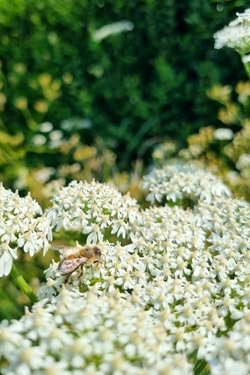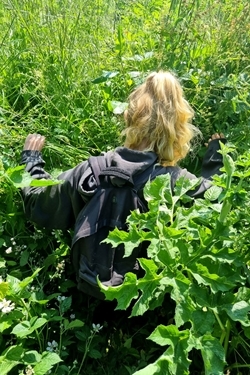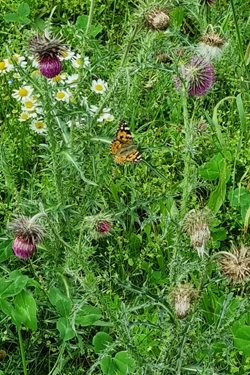By Jayna Connelly, Farmland Ecology Research Assistant
 Holding my breath, navigating clouds of pollen in rye fields - an expected state for an ecological researcher. But after yet another summer field season, I've uncovered the need for a myriad of skills beyond the obvious.
Holding my breath, navigating clouds of pollen in rye fields - an expected state for an ecological researcher. But after yet another summer field season, I've uncovered the need for a myriad of skills beyond the obvious.
I, along with the rest of the GWCT, pride myself on being part of a team that produces some of the most valuable and relevant scientific data on effective countryside management that benefits our ecosystems. To gather this data you need survey skills, identification skills, the ability to communicate effectively with people and sometimes even licences, but there is so much more that goes into a successful field season.
This year we completed nearly 500 pollinator transects for the FRAMEwork project and each survey came with its own challenges. Navigating a daily marathon of over 10km, battling brambles, and deciphering invisible gates is the ultimate test of willpower. Armed with determination and trousers that could probably withstand a nuclear blast, we face the wild terrains with a clipboard in hand, our official-looking prop.
But the real plot twist this year? Cue the entrance of a military helicopter on the horizon. Apparently, two innocuous girls in a field of rye triggered some serious suspicion. No doubt the chopper had a far more important mission to attend to; nonetheless it stopped and hovered above us, possibly debating whether our clipboard conferred top-secret status or if we were just overly enthusiastic agronomists.
 While tightrope-walking over nettle-filled ditches gets the nerves going, the helicopter drama took the cake. We played it cool, giving an award-worthy performance of nonchalance with a side of, “Oh, we're just counting bugs here.” Eventually, they must have figured out we were just harmless data gatherers and decided our clipboard wasn't concealing a secret mission.
While tightrope-walking over nettle-filled ditches gets the nerves going, the helicopter drama took the cake. We played it cool, giving an award-worthy performance of nonchalance with a side of, “Oh, we're just counting bugs here.” Eventually, they must have figured out we were just harmless data gatherers and decided our clipboard wasn't concealing a secret mission.
So, in the grand tapestry of fieldwork adventures, we added a chapter on attracting military helicopters. Note to self: clipboard as an unintentional VIP pass to aerial surveillance. Fieldwork, where every step is a potential plot twist!
Another talent I never expected to need as an ecologist is the innate ability to tell what the weather is going to do. Preferably I need to see into the future or have the psychic ability to predict the weather better than my weather apps can. I often joke that I made it into the best branch of ecology because insects hide away in bad weather. While strolling around in the sun sounds pleasant and easy, fieldwork is never that simple.
 The wet summer we experienced makes for quite the challenge when planning time-sensitive fieldwork. We did, however, successfully complete all the surveys, and while our data is still yet to be analysed, my general observations are complemented by this year’s results of the Big Butterfly Count. Notably ringlets were on the list of species that have severely declined – this was a species that did strike me as almost entirely lacking during my surveys this year. I remember as a placement student just 4-5 years ago seeing this underrated butterfly constantly. In some areas I could barely take a step without flushing tens of them, but this year I could count the number I saw between April and August on one hand. These butterflies should be common as adults between July and August and I cannot help but wonder if, for species such as these, the wet summer months are more than just a logistical inconvenience.
The wet summer we experienced makes for quite the challenge when planning time-sensitive fieldwork. We did, however, successfully complete all the surveys, and while our data is still yet to be analysed, my general observations are complemented by this year’s results of the Big Butterfly Count. Notably ringlets were on the list of species that have severely declined – this was a species that did strike me as almost entirely lacking during my surveys this year. I remember as a placement student just 4-5 years ago seeing this underrated butterfly constantly. In some areas I could barely take a step without flushing tens of them, but this year I could count the number I saw between April and August on one hand. These butterflies should be common as adults between July and August and I cannot help but wonder if, for species such as these, the wet summer months are more than just a logistical inconvenience.
Whether the unexpected hurdles of the fieldwork season are seen as ‘off-putting’ or ‘fun’, the potential catastrophic outcomes of climate change for species such as the ringlet butterfly remind me that every stinging nettle and scratch is worth it to help us gain a better understanding of the state of nature and continue to provide the data and tools to help wildlife in our countryside.